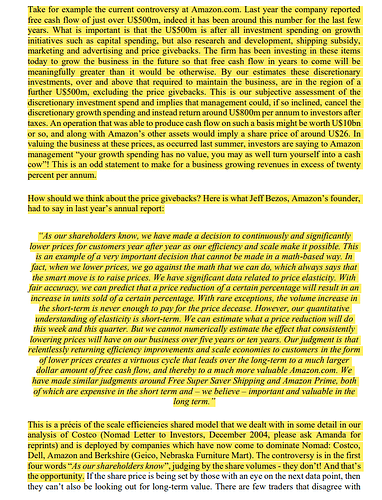A letter a day!
Letter #06 2006
1.Two handy investment models:
1)Any superiority an investment process may have will only emerge with time, so patience is important.
2)Stock markets posts prices every day. The prices the market sets reveals information about a company’s prospects which may or may not provide an opportunity, it is up to investors to either take the market up on its offer, or wait for another price, another day.
2.Index should not be your benchmark.
Zak and I have witnessed many investors make terrible investment decisions from thinking via the index. The most common mistake is to view the index (indeed any index?) as a risk free “home”. That this disposition still exists after the irrational index bubbles that preceded the Asian crisis and technology collapse may be testament to the strength of the marketing skills of the financial establishment. Once the index is seen as risk free the mistakes that follow cascade and include: requirement to have an opinion on everything inside the index regardless of one’s circle of competence, an unwillingness to invest in other better opportunities, and over diversification. These three mistakes destroy a lot of capital.
3.Good investing is a minority sport, which means that in order to earn returns better than everyone else we need to be doing things different to the crowd. And one of the things the crowd is not, is patient.
4.The business outcomes can be more predictable several years out than they are in the near term.
We have no idea where the market will end this year but given corporate strategies, capital allocation and starting valuations, I think we have some idea of how our companies will evolve over the next few years. In other words (at this point economics students may wish to cover their ears) the return from investing in shares can be both increased and de-risked by time.
5.How will you know that you are taking a different view than the crowd?
A clue can be taken from the period that other investors typically hold the shares of the companies you tend to hold.
If Berkshire Hathaway (US), Jardine Matheson (Hong Kong) and Next Media (also Hong Kong) are excluded (these firms are in a class of their own due to either stock illiquidity or investor education) then other investors hold stocks in our portfolio for on average twenty weeks. We expect to own shares for around two hundred and sixty weeks! So, what is going on? It seems to us that most investors look at the accounting outputs of a company (the reported financial data) as a guide to near term price movements and play the market accordingly. As stated in the investment objective section of the Nomad prospectus our goal is to “pass custody (of your investment) over at the right price and to the right people”. That’s what investing is. Zak and I concentrate on a deeper reality: the inputs to future value moves. (I have also attached the how Nick has related this philosophy with the example of Amazon)
| Subscribe To Our Free Newsletter |


